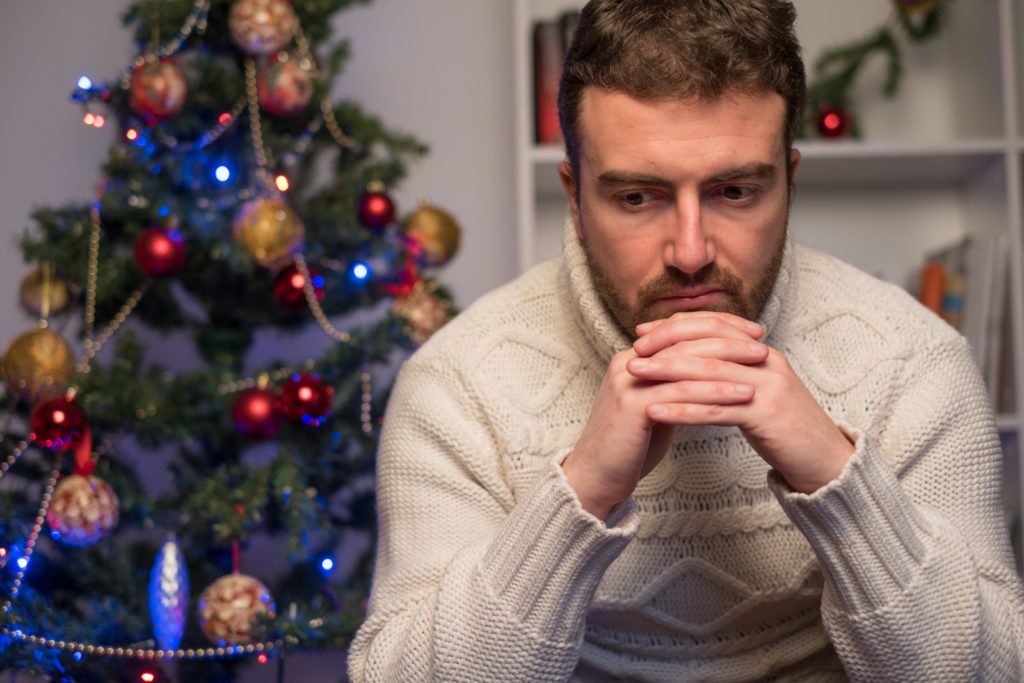Beating the Holiday Blues

As the holiday season approaches, many suffer from what’s known as the holiday blues. Yes, it’s a real phenomenon, but it has different effects more than people may know.
For some, the holidays don’t always bring tidings of great joy. They can be quite the opposite feelings as they are often associated with anxiety, depression, loneliness, painful self-reflection, stress, and sadness.
Even those who love the holidays can experience the blues during this busy season because it is often a time of high emotion and demands, which can leave some feeling stressed and exhausted.
People with a prior mental health condition may be even more prone to experiencing holiday depression. According to the National Alliance on Mental Illness (NAMI), 64% of people with an existing mental illness report that the holidays make their condition worse.
Signs & Symptoms
So, what are the common signs and symptoms of holiday depression? The first is a persistent or recurring feeling of sadness that begins as the holiday season starts. This feeling may vary in intensity and duration. Some people might feel down periodically but experience brief periods of feeling more upbeat.
Some signs of holiday depression may include:
- Changes in appetite or weight
- Changes in sleep patterns
- Depressed or irritable mood
- Difficulty concentrating
- Feelings of worthlessness or guilt
- Feeling more tired than usual
- Feeling tense, worried, or anxious
- Loss of pleasure in doing things you used to enjoy
According to a poll of more than 1,000 adults conducted by the Principal Financial Group — a global investment company — 53% of people experience financial stress due to holiday spending, despite the fact more than half set budgets for their holiday spending this year.
One survey by the American Psychological Association uncovered some interesting data about the holiday blues:
- While most people in the survey reported feelings of happiness, love, and high spirits over the holidays, those emotions were often accompanied by feelings of fatigue, stress, irritability, bloating and sadness.
- 38% of people surveyed said their stress level increased during the holiday season. Participants listed the top stressors: lack of time, lack of money, commercialism, the pressures of gift-giving, and family gatherings.
- Surprisingly, 56% of respondents reported they experienced the most amount of stress at work. Only 29% experienced greater amounts of stress at home.
While this data suggests that the holiday blues are a real phenomenon, it’s important to note that there are no systematic reviews or randomized controlled trials about mental health problems during the holiday season. The preliminary data indicate that this is a good topic for future research.
Tips on How to Feel Better
When dealing with the holiday blues, there are some ways to help get out of the “funk” and start to feel more positive.
It is important to give yourself time. This means giving yourself additional time for everything from unpacking to catching up on the mail. Schedule a day or two as catch-up time. Use this as a buffer before returning to the regular routine. Time helps reduce stress and the feeling of being rushed.
Change your mood by limiting social media. Talk to people by phone or in person instead. Personal contact helps to stimulate the brain and endorphins and serotonins.
Other ways include:
- Get some exercise. The Cleveland Clinic says you’ll feel happier and get those endorphins kicking in by going for a walk.
- Partake in nature therapy. It’s been proven that green spaces increase our sense of well-being.
- Eat well. Focus on fish, whole grains, dark chocolate, and green tea to combat stress.
- Get enough sleep. The Sleep Foundation says poor sleep contributes to depression and that someone might be more likely to deal with sleep issues if they are depressed. 3
- Find out if you’re suffering from seasonal affective disorder (SAD). SAD is a recurring depressive disorder during seasons of more darkness. A recent study found adding exercise and going to the gym can effectively treat SAD.
- Be nice to yourself. Cut yourself some slack and administer self-care.
- Schedule something to look forward to on the calendar. Rather than slog through January, set up a time with friends to play sports, to check out a museum show, or to meet for a special lunch.
- Watch funny movies. Humor and laughter reduce stress.
- Communicate that you’re feeling down. Tell family and close friends what you’re going through. They might be helpful.
It’s natural that after all the excitement and busyness of the holidays, that many experience a low coming down off the highs. If you are struggling mildly with these after-holiday blues, try
some of the suggested remedies above. You’ll probably be able to shake off these lows, cheer up and be ready to tackle the new year.
It is important to note that there is a difference between the holiday blues, which typically go away when the holiday season ends, and more severe depression, which lasts longer and interferes with activities of daily living. If the holiday season passes and you’re still feeling depressed or anxious, it’s best to consult with a medical professional. Don’t be afraid to seek professional support.
SkyePoint’s Resources
SkyePoint’s Employee Assistance Program (EAP) offers many benefits and resources for our team members. Here are a few listed below.
- Guardian provides an EAP program which is available to all SkyePoint Decisions employees through their Help Line directly at (800) 386-7055.
- Cigna offers Behavior Health Programs which are available to employees enrolled in the Cigna medical plans.
- Cigna’s Talkspace digital space is convenient for counseling support. Cigna-covered employees may access Talkspace at talkspace.com/cigna
- Cigna-covered employees can access the Cigna provider network at www.mycigna.com for providers who specialize in mental health services. Team members can sign in with their username and password to access providers in their zip code-based travel range.
Sources
https://www.verywellmind.com/what-are-the-post-holiday-blues-5214403 https://www.verywellmind.com/holiday-blues-4771716 https://www.psychologytoday.com/us/blog/evidence-based-living/201712/what-we-know-about-the-holiday-blues
https://evidencebasedliving.human.cornell.edu/2015/12/16/what-we-know-about-the-holiday-blues/ https://www.healthline.com/health/depression/holiday-blues#management